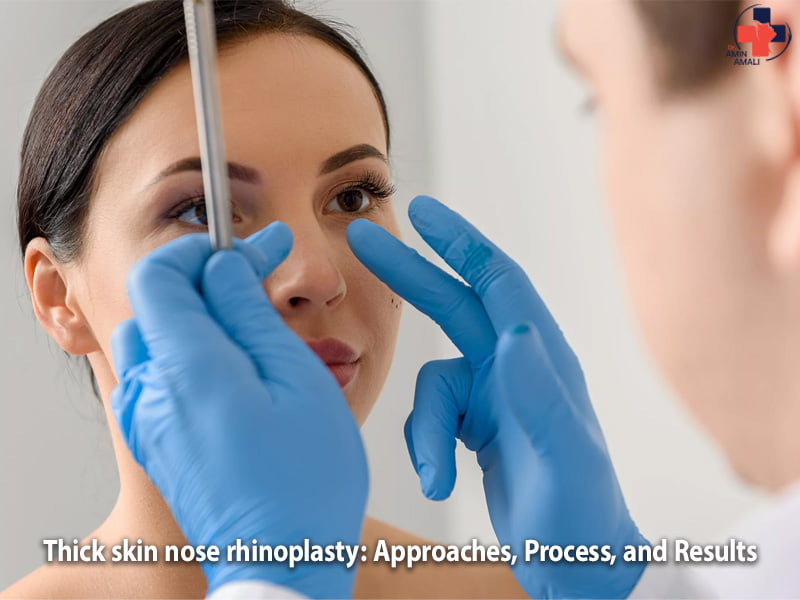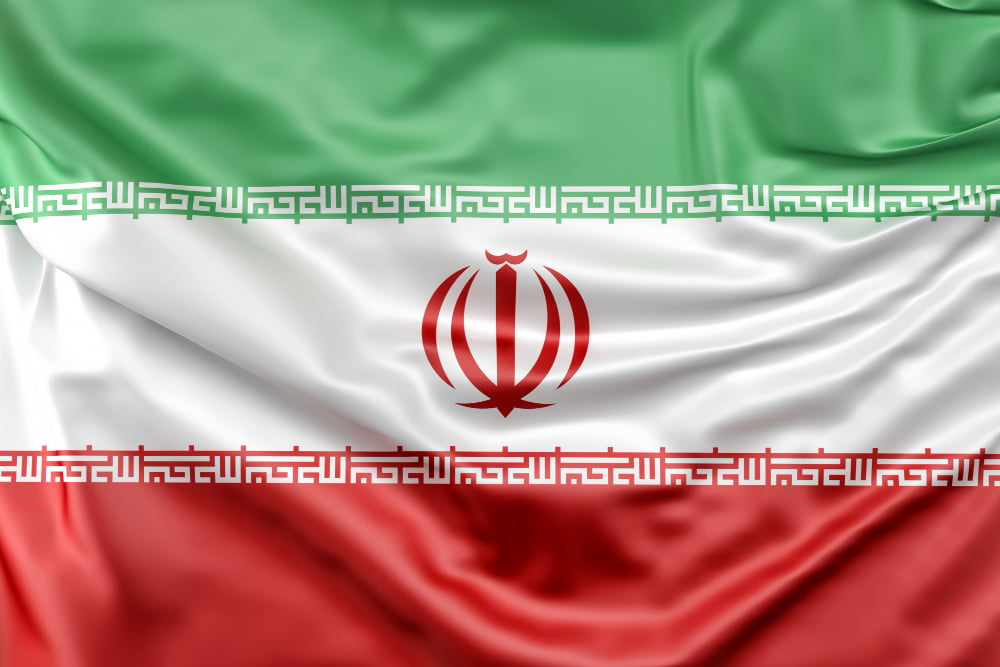Thick skin nose rhinoplasty is specified for a special kind of nose, which we call a thick skin or fleshy nose. This type of nose has some distinctive features like thick skin and a lot of soft and fleshy tissue around the main bony structure of the nose, which is usually weak and vulnerable. if you wnat to know every thing about this type of rhinoplasty, follow the text.

How to Identify a Thick Skin Nose?
In general, an individual’s nose can have various distinctive features, making the categorization of nasal types somewhat challenging. However, through medical examinations and studies, doctors have established comprehensive classifications, dividing noses into two main categories: thick skin and thin skin.
Thick skin nose:
This is one of the most common nasal types, especially in Iran. It is characterized by soft and thick skin tissue with a thick skin covering. The underlying structure of the nasal tip in this type is often weaker, making access more challenging and contributing to the complexity of thick skin nose surgery.
Thin skin nose:
In contrast to the thick skin type, this type has thin skin, minimal tissue, and its form relies more on bones and cartilage. The thinner nasal structure allows for easier access, enabling surgeons to make more significant changes to the nose’s appearance.
Factors Influencing the Results of Thick Skin Nose Surgery
While the results of thick skin nose surgery are often permanent, they can be influenced by various factors. Here are some key considerations regarding the outcomes of this surgery:
Clarity of Expectations: Clearly communicating and understanding expectations before surgery is crucial. Your rhinoplasty surgeon should discuss and comprehend your expectations to explain the achievable extent of changes.
Surgical Complexity: The complexity of the surgery can significantly impact the results. Some cases may require more intricate procedures, affecting the final outcome.
Individual Factors: Personal factors such as age, nasal structure, and overall health can also play a role. Individuals may experience different rates of recovery based on these factors.
Postoperative Care: Proper postoperative care is essential. Adhering to the surgeon’s instructions, taking prescribed medications, and following postoperative care guidelines can reduce complications and promote quicker recovery.
Different Techniques in Thick Skin Nose Surgery:
While thick skin nose surgery falls under the broader category of rhinoplasty, most techniques can be applied. However, due to the specific characteristics mentioned earlier, there are limitations in performing certain techniques for thick skin nose surgery. The primary categorization of rhinoplasty techniques includes open and closed approaches.
Open Technique:
This method is slightly more invasive and may result in a longer recovery period. However, it often produces better results. It is commonly used for surgeries involving bony noses, and its application in thick skin nose surgeries is limited.
Closed Technique:
This technique involves fewer incisions, leading to a significantly shorter recovery time. However, it imposes constraints on the surgeon, making it more challenging to perform extensive changes. This limitation makes it suitable for certain types of surgeries, especially thick skin nose surgeries, where extensive alterations are unnecessary.
Preoperative Measures for Thick Skin Nose Rhinoplasty:
Before undergoing thick skin nose surgery, there are crucial measures that can contribute to a smoother and more successful procedure. These measures include:
Consultation with the Surgeon: The initial meeting with the rhinoplasty surgeon is essential. Discussions should encompass your needs, expectations, and a detailed explanation of the surgical process.
Imaging and Evaluation: The surgeon may use imaging techniques, such as a nasal CT scan, to assess the precise nasal structures. This information aids in planning a more accurate surgical procedure.
Medication Adjustment: The surgeon may advise discontinuing specific medications, especially those that thin the blood, in the weeks leading up to the surgery. Full disclosure of your current medications is crucial.
Smoking Cessation: Ceasing smoking several weeks before surgery is advisable. Smoking can significantly impact the healing process and surgical outcomes.
Education on Postoperative Care: The surgeon will provide instructions on prepping for postoperative care. This includes dietary changes, rest, and prescribed medications.
Psychological Preparetion: Mental and emotional readiness is crucial. Being prepared for changes in physical appearance is essential for a positive postoperative experience.
What It’s Like to Have a Nice Nutrition After Thick Skin Nose Rhinoplasty?
Following rhinoplasty, especially in cases involving a thick skin nose, proper nutrition is essential to support the healing process and promote optimal results. Here’s what you can consider for a healthy diet after thick skin nose rhinoplasty:
Hydration:
Staying well-hydrated is crucial for overall health and healing. Water helps flush out toxins from the body and aids in the recovery process. Aim to drink an adequate amount of water each day.
Anti-Inflammatory Foods:
In the initial stages of recovery, there may be swelling and inflammation. Incorporating anti-inflammatory foods into your diet can help manage these symptoms. Include foods like:
- Fruits: Berries, pineapple, cherries
- Vegetables: Leafy greens, broccoli, tomatoes
Omega-3 Fatty Acids:
Include foods rich in omega-3 fatty acids, such as salmon, walnuts, and flaxseeds. These contribute to the anti-inflammatory process.
Protein-Rich Foods:
Proteins are essential for tissue repair and recovery. Include lean protein sources in your diet to support healing. Options include: Chicken, turkey, and lean meats, Fish and seafood, Eggs, Legumes and beans
Vitamins and Minerals:
Ensure you get a variety of vitamins and minerals to support your immune system and overall health. Consider foods rich in:
- Vitamin C: Citrus fruits, strawberries, bell peppers
- Vitamin A: Sweet potatoes, carrots, spinach
- Zinc: Nuts, seeds, whole grains
Avoiding Certain Foods:
In the early stages of recovery, it’s advisable to avoid foods that may increase inflammation or pose challenges to healing. These may include:
- Spicy foods
- Foods high in sodium
- Excessive caffeine and alcohol
Soft and Easy-to-Chew Foods:
If you experience any discomfort or have restrictions on chewing due to the rhinoplasty procedure, opt for soft and easy-to-chew foods. This can include:
- Soups and broths
- Mashed vegetables
- Smoothies and yogurt
Note:
Consultation with Your Surgeon- Always consult with your surgeon regarding any dietary restrictions or recommendations specific to your recovery. They may provide personalized advice based on your surgery and individual health needs.
Patience and Monitoring- Remember that the recovery process is unique to each individual. Listen to your body, and if you notice any adverse reactions to certain foods or if something doesn’t feel right, consult with your surgeon.
It’s important to note that postoperative nutrition is just one aspect of the overall recovery process. Follow your surgeon’s postoperative care instructions diligently, attend follow-up appointments, and communicate any concerns or changes you observe. A well-balanced diet, coupled with proper care and patience, contributes to a smoother and more successful recovery after thick skin nose rhinoplasty.”












